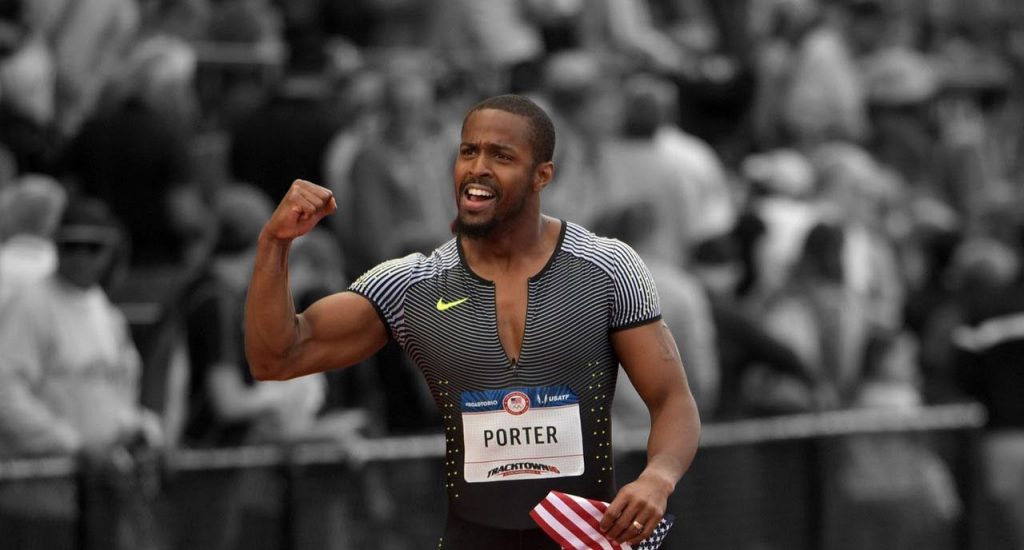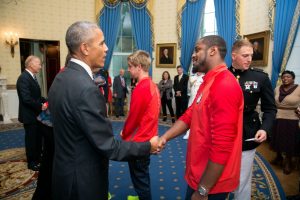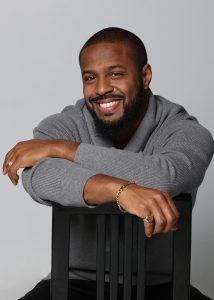
By Dr. Jeff Porter, U-M Director of Student-Athlete Alumni Relations and Former Olympic Athlete
The moment is quickly approached; much faster than anticipated. You spent years perfecting your athletic ability and cultivating and crafting your athletic identity to reach the pinnacle of success as an athlete. With the end of your athletic career, are you now supposed to let go of that identity and become someone else? Is that even possible?
There are traits of my athletic identity that propelled me to success after my athletic career ended, and I am of the belief that you do not need to let go of your athletic identity, but rather redirect your focus. I am not saying this is easy but will certainly pay dividends in the long run.
I went from being a collegiate student-athlete to an Olympic athlete to a retired athlete, and the transition is still challenging.
One of the hardest mental barriers I have had to manage is how to maintain my athletic identity. I was known as an athlete for so long that I began to internalize that identity until a mentor of mine told me plainly that being an athlete is part of who I am, but it does not define all that I am.
It certainly took a while for me to accept those words, but they ring true now more than ever. I was an athlete and competed at the highest levels, but I am more than that.
Once you are able to find comfort in the fact that you were an elite level athlete, but that was not and is not all that you are, understanding how to adjust your athletic identity can be a bit easier. Although retired, I still have not lost that competitive edge and I don’t think that will ever disappear. The purpose of this piece is to learn how to direct that attribute into something that can be productive and help you develop beyond the last game, meet, or match.
the point is that athletics does not define your identity. It is simply something you do. As I have learned, I am much more than an athlete.
Below are some of the things I have used to transition into this non-athlete life, while still maintaining some sort of athletic identity.
Find another activity you like doing
After I retired from competing, I had little to no interest in doing sprinting workouts to stay active, but I did enjoy weightlifting.
For some reason, I have always found weightlifting to be therapeutic for me and have continued to do this long after my retirement. I encourage you to find activities that keep you active and that you actually enjoy doing.
For some it may be climbing, and others may enjoy biking, but the key is to stay active. Because I have been a competitive person my entire life, I cannot simply turn that off, so I use the competitive spirit to either compete with myself or create “friendly competitions” with my friends. These “friendlies,” as they have come to be known, help me stay fit while maintaining that athletic mindset.
I have even taken up various forms of martial arts because it provides another activity that I can dedicate time to learning how to perfect, similar to what I did as an elite athlete.
Find a way to stay involved in sports
Beyond working out, I have found that I can coach kids or volunteer to serve on committees, which helps me stay around the sports world without being an athlete.
Many athletes that I have come into contact with fail to realize the vast array of positions and activities they can be engaged in without being an athlete. I personally serve on several athlete committees within the United States Olympic and Paralympic Committee (USOPC) that continue to keep me connected to the sports communities that I was a member of.
Nonetheless, there are many opportunities former athletes at any level can do that will keep them connected. I encourage you to find the right fit for you.

Jeff Porter (right) meeting with President Obama.
Like many athletes, I have spent countless hours over multiple decades trying to perfect myself as an athlete without giving much thought to what happens when I am no longer competing.
If you asked me 10 years ago what I was passionate about my answer would have been simply, “running fast.” I was investing a considerable amount of time, effort, and financial resources, and running fast was my sole passion.
I quickly discovered that when I was not training, I had a significant amount of free time to myself and was usually bored. During those moments of complete boredom, it dawned on me that I needed to figure out what else I enjoyed doing that was not athletics related.
I began reading books that seemed interesting and explored post-athletic career options. I found out that I had a passion for learning and teaching others. This led me to explore pursuing advanced degrees while continuing my training and preparation for the Olympics.
I was grateful to find something to do other than sit around and think about my competitions all day, which I believe greatly helped my performance in the long run because I was more relaxed.
Find a mentor (or mentors)
Having several people in my life that I can trust to provide me with guidance, who challenge me but also have my best interest in mind, continues to be a valuable asset for me.
These people all have unique skill sets and backgrounds but they have invested in me and my continued growth as a person. The value in having mentors is that they can challenge your commonly held beliefs about yourself and push you to think about how to get better both in and outside of the athletic arenas.
Because of their experience, mentors can offer you words of wisdom or help guide your career path. You can learn from their experiences without having to learn those lessons the hard way.
I had to understand that just because I competed in an individual sport did not mean that I had to try to figure everything out on my own. That would have been inefficient and a complete waste of time. I trusted that my mentors had my best interest in mind, especially when they told me things that I did not want to hear; for example, “You need to prepare yourself, because one day you will not be competing.”
They continued to remind me that I am more than my sport and encouraged me to discover things about myself that I didn’t even know. For these reasons, I always encourage athletes to get a mentor because this transition is already challenging enough, why go it alone?
Start Early
Whether you are beginning your last year of competition or you are in the middle of your best athletic performances, preparing for the eventual identity shift early will be advantageous.
It is easier to think, plan, and act before you finish your competitive career versus when you are already done and trying to figure out, “now what?”
Well before I knew I was going to retire, with the help of my mentors, I began considering who I am and what I will do once I could no longer compete. The good news is that I started this inner reflection while in the midst of some very good competitive years.
After figuring out who I was and what I wanted to do, I started to plan.
I went back to school for a series of advanced degrees. I became involved in sports committees. I started coaching. And I was looking for a career that I could enjoy.
This was all done knowing that sooner or later there would come a time when I had to leave the athlete identity in the past and identify as something else.
I approach my non-athlete life with the same tenacity as I did when I was competing which has helped that transition as well. I encourage you to recognize that you were a competitive athlete (maybe even one of the world’s best), which is something to be celebrated.
Nevertheless, the point is that athletics does not define your identity. It is simply something you do. As I have learned, I am much more than an athlete.
 About the Author
About the Author
Jeff Porter, Ph.D., is the University of Michigan Athletic Department’s Director of Student-Athlete Alumni Relations & Premium Seating Associate. Dr. Porter is a native of New Jersey and the current sport administrator for the U-M track & field and cross country programs, for which he competed during his undergraduate studies.
Dr. Porter graduated with a B.A. in Kinesiology in 2007 from U-M, an M.A. in Higher Education in 2011 and a Ph.D. in Educational Leadership in 2017 from Eastern Michigan University.
The 2007 NCAA Champion in the 60m hurdles and a three-time NCAA All-American, Dr. Porter won the 2007 Big Ten Medal of Honor. He qualified for the 2012 and 2016 Olympic Games, held in London and Rio De Janeiro, respectively, in the 110m hurdles.
Dr. Porter concurrently serves as Chairman of the Athletes Advisory Committee for U.S. Track & Field (USATF) and as a member of its Board of Directors. He is involved in the USATF’s planning of the 2022 World Athletics Championships to be held in Eugene, Oregon, as well as the 2028 Olympics, to be held in Los Angeles.
Additional Resources
